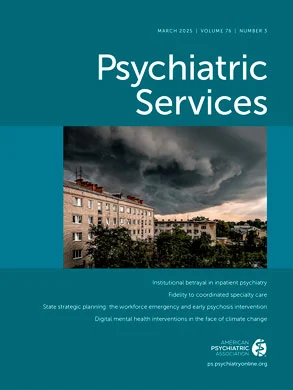To the Editor: With the advent of atypical neuroleptic medications, psychiatrists have begun switching certain patients from depot neuroleptics to atypical drugs, anticipating a better therapeutic outcome. We set out to reevaluate the effectiveness of depot antipsychotics in our practice.
The case records of all patients attending a depot clinic at University College Hospital in Galway, Ireland, were examined. Patients were classified as being off depot medication if at the time of hospital admission they had not received an injection in the last three months or any time previously. Length of hospital stay was totaled cumulatively for each patient and classified as either on-depot or off-depot. Data were analyzed using Wilcoxon's signed rank test.
We identified 113 people currently on depot injection treatment in a general population of 33,614 in the West of Ireland, or approximately three in every 1,000. In comparison, 1 in 1,500 were identified in a previous study by Crammer and Eccleston (
1) of a general population in the Northern Regional Health Area of the United Kingdom. The majority of our patients, 84 (74.3 percent), had a diagnosis of schizophrenia; 13 (11.5 percent) had schizoaffective disorder; and eight (7 percent) had bipolar disorder.
We compared data for individual patients for periods when they were receiving depot drugs with periods when they were not on depot, either before the drugs were initiated or during periods of noncompliance or discontinuation. The mean±SD number of admissions for patients not on depot injection treatment was 4.5± 4.3 but fell to 3.4±5.3 after depot treatment was implemented, a significant difference (Wilcoxon test, z= -3.317, two-tailed p=.001). The mean length of stay while off depot was 132.16±152.2 days, compared with 101.8±160.4 days while on depot (z=-2.17, two-tailed p=.02).
Depot effect was most significant for patients with schizophrenia; their mean number of admissions fell from 3.89±3.43 while off depot to 2.64± 4.19 on depot (z=-3.122, two-tailed p =.001). Their length of stay fell from a mean of 129.2±170.7 days to 91.8 ±125.0 days (z=-2.208, two-tailed p=.02). The effect of depot prescription was not evident for those whose illness had an affective component. An increase in both mean number of admissions and length of stay was noted for the eight patients with schizoaffective disorder or bipolar disorder.
Previous studies that looked at the efficacy of depot versus oral medication found that depot medications reduce the rate of relapse (
2,
3,
4). Our study further confirms this finding, which obviously may relate to better compliance. However, we demonstrated a diagnostic effect, whereby schizophrenic patients had reduced hospital stay, and depot medication was less effective for patients with affective illness.
Our study has obvious methodological limitations. The selection of patients was not random and probably included a group with a history of poor compliance with treatment. The sample was limited to patients receiving depot injections; we are unaware of the number of "depot failures," or patients who showed no response and whose depot injections were discontinued. Hospitalization may not be a sufficient index of clinical course. Frequency of episodes of illness may be a more reliable indicator, but unfortunately we were unable to assess its importance.
Atypical antipsychotic drugs have proved beneficial for many patients, particularly as they appear to be associated with a lower rate of extrapyramidal side effects and possibly tardive dyskinesia. However, an economic analysis that compared depot antipsychotic treatment with a traditional oral neuroleptic and an atypical medication (risperidone) concluded that switching to depot medication for outpatient therapy could result in lower treatment costs (
5). Furthermore, it is clear that certain patients, mainly because of noncompliance, will require maintenance depot antipsychotics. Our study strengthens the argument that depot medication remains a useful tool in psychiatric treatment.

